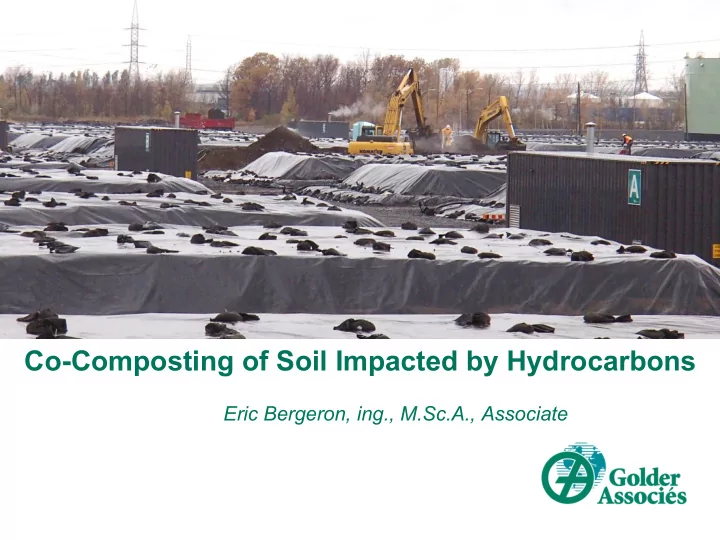

Co-Composting of Soil Impacted by Hydrocarbons Eric Bergeron, ing., M.Sc.A., Associate
Presentation Outline � Site description � What is co-composting? � Treatment strategy � Lab and pilot-scale � Full-scale � Conclusion 16-05-05 2
Site Description � Heavy industrial area � Former petrochemical activities � Underground/above ground utilities dismantled � Fractured clay et silt � Free phase � Heavy TPH and PAH � 120 000 m 3 of impacted soil � Remediation target : 3500 ppm C10C50 16-05-05 3
What is co-composting? Composting is a process in which organic matter are degraded quickly by � microorganisms at elevated temperatures under aerobic condition (C/N ≈ 20-30) Co-composting → add organic amendments (manure) to the impacted soil to � enhance biodegradation � Organic amendments + soil + air + water (60% WHC) � Typical temperature : 55-70 oC � Thermophilic +mesophilic bacteria � ↑ solubility of C/N/P 20 50 Temperature ( ° C) % O 2 , CO 2 in air � ↑ bioavailability 49 15 48 � ↓ Clay cohesiveness 10 47 5 46 Oxygen Carbon dioxide Temperature 0 45 0 20 40 60 80 100 120 Time (min) 16-05-05 4
Co-Composting Windrow Modified Biopile 16-05-05 5
Strategy Remediation Treatability Approach SCM Options Testing Selection Design et Implementation O&M Shut-down planning 16-05-05 6
Remediation Options � Composting � Thermal desorption � Composting and Thermal desorption 16-05-05 7
Laboratory Testing � Degradation rate → treatment time � Microcosms (Montreal & Calgary) � Reactor (200 L - 1 m 3 ) 16-05-05 8
Laboratory Testing Thermocouple Implants/air 16-05-05 9 9
Pilot-Testing � 200 m 3 biopile � Temperature monitoring � Gas monitoring � 5 months operation � 3 mixtures tested 16-05-05 10
Pilot-Testing
Full-Scale � 48 piles of 700-1000 m 3 � 8 air extraction system of 1200 cfm � Leachate recirculation system � Fully automated system � Organic amendments : < 30% v/v 16-05-05 12
Full-Scale Excavation 16-05-05 13
Full-Scale 5-6 days 20 o C → 70 o C Pathogen limit DARAMEND 10 weeks 16-05-05 14
Full-Scale 16-05-05 15
Full-Scale F2 (C10C16): 5% F3 (C16C34): 27% F4 (C34C50): 12% F4G (C50+): 55% 16-05-05 16
CONCLUSIONS Co-composting is an efficient biological process, cost competitive and sustainable which can treat hydrocarbons that are recalcitrant to conventional biopile 16-05-05 17
QUESTIONS Québec Engineers Association Leonard Award – 2015 16-05-05 18
Recommend
More recommend